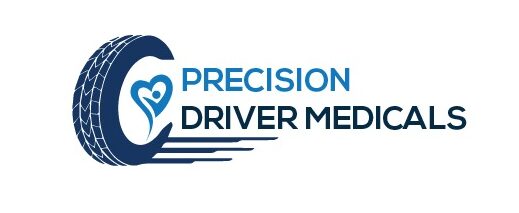Learn the DVLA vision requirements for drivers in the UK. Understand eyesight standards for HGV, PCV, and taxi drivers, including eye tests, color vision, and medical checks. Book your driver medical today with Precision Driver Medicals.
Introduction
Clear and healthy vision is one of the most important factors for safe driving. Whether you’re a lorry driver, bus operator, or taxi driver, your eyesight directly affects your ability to judge distances, read road signs, and respond to unexpected hazards.
At Precision Driver Medicals, we perform comprehensive driver medicals across the UK to ensure all drivers meet the DVLA vision requirements for drivers. Our GMC-registered doctors provide professional and affordable medical assessments, helping you stay compliant and confident behind the wheel.
Why Vision Matters for Road Safety
Driving demands constant visual awareness. From checking mirrors to spotting pedestrians, your eyes are your first line of defense on the road. Poor vision can slow reaction time, increase accident risk, and lead to license suspension if not corrected.
The DVLA’s vision standards are designed to make sure all drivers have the eyesight needed for safe road use. These standards apply to all categories of drivers—including Group 1 (cars and motorcycles) and Group 2 (lorries and buses) license holders.

DVLA Vision Requirements for Drivers
The DVLA vision requirements for drivers differ slightly depending on the type of vehicle you drive. Let’s break down what’s needed for each category.
Group 1 Drivers (Cars and Motorcycles)
To meet the vision requirements for drivers in Group 1, you must be able to:
- Read a vehicle number plate from 20 meters away (with glasses or contact lenses if needed).
- Have a visual acuity of at least 6/12 (0.5) on the Snellen scale in your better eye.
- Have adequate field of vision in both eyes.
You can use corrective lenses, and you must wear them whenever driving if they are needed to meet the standard.
Group 2 Drivers (Lorries and Buses)
Because HGV and PCV drivers operate larger and more powerful vehicles, the vision requirements for drivers in Group 2 are more stringent.
You must:
- Have a visual acuity of at least 6/7.5 (0.8) in the better eye and 6/60 (0.1) in the other eye.
- Meet the minimum field of vision requirements, verified by an optician or doctor.
- Have no significant double vision.
- Be able to meet these standards with or without corrective lenses.
Drivers who rely on corrective lenses must always carry a spare pair while driving professionally.
Color Vision and Peripheral Vision
While color blindness doesn’t automatically disqualify you from driving, it’s important to distinguish between red, amber, and green traffic lights.
Peripheral vision—the ability to see objects out of the corner of your eye—is also critical. Reduced peripheral vision can make it difficult to notice other road users or hazards. During your driver medical at Precision Driver Medicals, our practitioners check both these aspects to ensure compliance with DVLA vision requirements.
Eye Tests During a Driver Medical
At Precision Driver Medicals, every medical includes a professional eye test as part of your driver assessment.
Our GMC-registered doctors will:
- Measure visual acuity using the Snellen chart.
- Assess peripheral vision to detect any blind spots.
- Check for signs of eye conditions such as cataracts, glaucoma, or diabetic retinopathy.
- Confirm if your vision meets DVLA Group 1 or Group 2 standards.
This quick and accurate test ensures you remain safe, compliant, and fit to drive.
Common Vision Problems Among Drivers
Even small changes in eyesight can affect your ability to meet the vision requirements for drivers. Some common issues include:
- Short-sightedness (Myopia): Difficulty seeing distant objects clearly.
- Long-sightedness (Hyperopia): Trouble focusing on nearby objects.
- Astigmatism: Blurred or distorted vision due to irregular eye shape.
- Cataracts: Clouding of the lens, affecting clarity.
- Glaucoma: Damage to the optic nerve causing blind spots or vision loss.
If any of these conditions affect you, you may still drive as long as your vision meets DVLA standards with correction.

How Often Should Drivers Check Their Vision?
According to DVLA guidance, drivers should have their eyes tested:
- At least every two years if you are under 40.
- Annually after age 40.
- Immediately if you notice any change in your vision.
Regular testing ensures you continue to meet the vision requirements for drivers and helps detect early signs of eye disease.
At Precision Driver Medicals, we make this process simple and affordable. You can book your driver medical online and get a full eyesight assessment in around 15 minutes.
What Happens if You Don’t Meet the Vision Standards?
If your vision falls below DVLA standards, your doctor or optician will guide you on corrective steps—such as new lenses or medical treatment.
In some cases, drivers who fail to meet the vision requirements for drivers may need to stop driving temporarily until the issue is resolved. Failing to report a vision condition to the DVLA can result in a fine of up to £1,000 and possible license revocation.
That’s why regular, professional medical checks are so important—and why Precision Driver Medicals exists to help drivers stay compliant and safe.
Why Choose Precision Driver Medicals?
We are trusted across the UK for professional, affordable, and DVLA-compliant medicals.
Here’s why drivers choose us for their driver medical and eye test:
- Fast appointments—typically under 15 minutes.
- GMC-registered doctors with driver medical experience.
- Includes full eye test and blood pressure check.
- Convenient online booking available 24/7.
- Nationwide locations, including Stoke-on-Trent, Birmingham, Croydon, and Peterborough.
- Competitive pricing with no hidden fees.
We understand the pressures of maintaining a professional driving license—that’s why we make compliance simple, stress-free, and cost-effective.
Tips for Maintaining Good Driver Vision
To help meet and maintain the vision requirements for drivers, follow these tips:
- Eat foods rich in vitamin A and antioxidants (like carrots and spinach).
- Wear UV-protective sunglasses when driving in bright sunlight.
- Keep your windscreen clean to avoid glare and distortion.
- Rest your eyes on long journeys to prevent fatigue.
- Visit an optician regularly—especially if you drive professionally.
Small lifestyle habits can make a big difference to your long-term eye health.
Book Your Vision and Driver Medical Today
At Precision Driver Medicals, we make it easy to stay compliant with DVLA vision requirements for drivers.
Whether you need an HGV medical, taxi driver medical, or renewal check, our clinics provide quick, professional, and affordable assessments.
👉 Book your appointment online today to ensure your eyesight meets the official standards—and keep your career on the road.
Final Thoughts
Meeting the vision requirements for drivers is more than a legal obligation—it’s about ensuring safety for you and everyone on the road. With the right support, regular testing, and professional guidance, staying compliant is simple.
Trust Precision Driver Medicals for accurate, efficient, and DVLA-approved vision assessments across the UK.
Top Services
- Driver Medical
- HGV/Lorry Drivers (HGV medical)
- Taxi Drivers (Hackney Carriage & Private Hire Medical)
- Private Hire
- PCV/Bus Drivers (PCV medical)
- PCO Medical
- Bus Medical Service
- Motorhome Medical
- Ambulance Medical
- Forklift Driver Medical
- TFL Medical
Top Links
10 Important Links for Driver Medicals UK
- DVLA – D4 Medical Examination Report
→ Official D4 form for HGV/PCV drivers. - DVLA – Driving Licences for Lorry, Bus and Coach Drivers
→ Requirements for becoming a lorry or bus driver. - TfL – Private Hire and Taxi Driver Medical Requirements
→ TfL’s official medical guidelines for PCO/private hire drivers. - DVLA – Eyesight Rules for Drivers
→ Legal eyesight standards for all UK drivers. - DVLA – Medical Conditions and Driving
→ Guidance on how medical conditions affect driving eligibility. - NHS – Medical Exams for Professional Drivers
→ NHS overview of driver medical exams. - Driver & Vehicle Standards Agency (DVSA)
→ Regulator for driving and vehicle safety standards in the UK. - General Medical Council (GMC)
→ Authority for registered medical professionals in the UK. - Gov.uk – Renew Driving Licence
→ Process for renewing a UK driving licence. - National Register of LGV Instructors (NRI)
→ Training and standards for LGV/HGV instructors.


